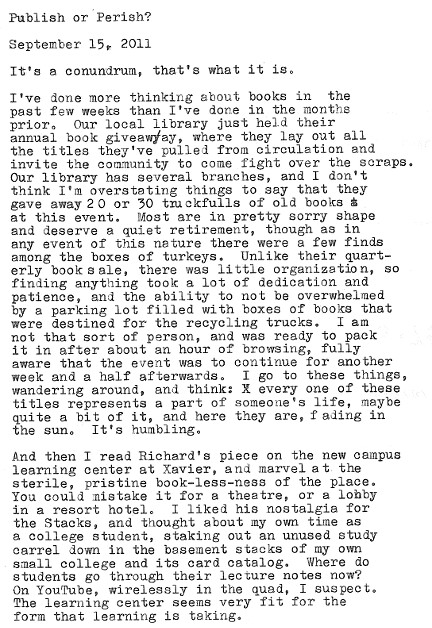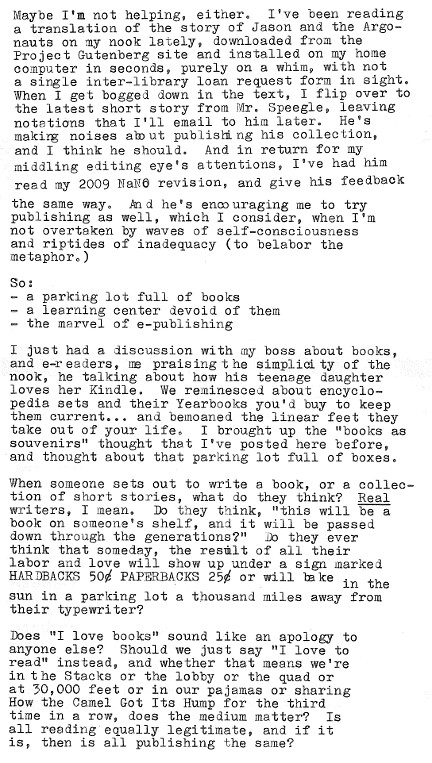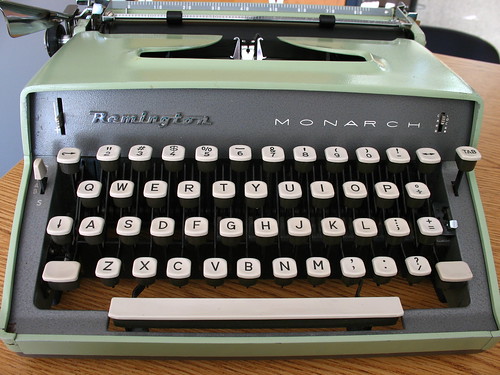


I'm not trying to imply that Mr. Speegle falls short of a "real writer" definition, by the way. I don't actually know what that definition includes.
- Why Libraries? at Writing Ball
- The ongoing saga of Pen and Platen at Just Write
- Me, musing on the future of books, getting hyped about the nook


7 comments:
That parking lot is a melancholy sight ...
Your typecast brings up mixed emotions in me. One side of me is an eager Internet fiend devouring digital content; the other side is a contrarian who loves paper and print, as in my library talk.
I suppose we should all face the fact that, whether we publish on the Web or in a printed book, at most 10% of what we write will be read by anyone a year from now; at most 1% will be read in ten years; and in a century, it's all going to be scattered, lost, and forgotten. Your most faithful reader, and arguably the most important one, is yourself.
Heavy. What I always think when libraries do this is, "What opportunities am I missing?" About 10 years ago my wife and I read every Perry Mason novel in order. I doubt the library still has all (or even most) of them anymore.
I too get those conflicted-type feelings when it comes to books v. digital media. Don't get me wrong: I loves me some pagey-turney and some inky smells. BUT! I also love trees. And let's face it, the average trip through a used-book sale tends to feature a lot of crap that ain't worth bein' printed on the carcass of a dead-ass tree.
Ahem.
In other news, have I mentioned you should publish? Oh, I have? Today, you say? Well, certainly not within the last hour.
Dear internet: Mr. Clemens may try to minimize his authorial skills, but I can personally attest to the fact that One Last Quest is very very good. Almost excellent. Please join me, if you will, in browbeating him into sharing his talent with the world.
There are so many options available in which to access information these days, that it's not an "either-or" proposition to me. Each medium has its place, and each is valid. I enjoy it all, although I must admit that I lean towards the "old fashioned" way of absorbing information through books.
I do appreciate the fluidity of being able to read a physical book if I want, then turn around and read something online, or a Kindle (if I had one, which I don't).
The same goes for writing.
I cannot answer the publishing question, because for me to eschew paper would be a certain death of writing on a typewriter, which I dearly love. It's a hard call.
The sound of one hand clapping in the forest...
I just commented on Speegle's blog saying I think you should publish your story. Whether that's as simple as putting it out on your site and say here's my story or going down the path of self-publishing through tools (i.e. digital formatting, getting on a pay distribution site) or doing the legwork and finding an agent and perhaps publishing house that would be interested (as there are bound to be for your target audience).
Its a fun story and worth reading, especially if you are into fantasy books, fantasy movies or fantasy role-playing games.
I'll read whatever I can get my hands on, as long as its interesting. Digital or not, makes no difference to me (which is not good for the authors, as I'm not likely the type of person that makes them money).
As to the thought of a real writer, I truly believe that they just write the damn story they want to and when they are happy with it, they are done.
A writer wanting to make a career of writing, obviously wants to make enough money to support himself, but before they can, they just keep writing stories and are happy doing it.
If the stories are good, well, then you still have to market the heck out of them or have someone, i.e. an agent and publisher, do that for you. You can certainly self-publish, but to get people to read it, means you have to take on that role of marketing department and really go after it.
Or, you can be happy that a dozen or so people read and enjoyed your story and leave the rest to fate:)
Not really on subject, and perhaps not an issue...but I wonder a bit about where old e-books will go to die. I mean...even these sad books had something of a second chance. There's always a slight chance someone will rediscover them and bring them back to life. Old books are frequently rereleased, if there's something worth saving. E-books will just be gone.
Lots of great replies here, everyone. Thanks. I was hoping that my cold-addled state wouldn't make this post too obscure.
@Richard: the parking lot was almost too much (though it was a hot day, which didn't help.) Knowing that that scene went on every day for two weeks(!) didn't help, nor did stumbling across the occasional pile of what were obviously a local author's donated books (many copies of the same title.) Longevity of any piece of print is a good question.
@Notagain: I know the feeling. I looked at every single box in that photo the day I was there. Was it worth the time, though? There was a lot of dross. At least I better appreciate the work that goes into sorting the titles for the book sale.
@Speegle: I'll be defacing your blog comments later. Be warned.
@Cameron: Nothing precludes you from using a typewriter for writing, of course. I still contend that it's the idea tool for first drafts, and rewrites, if you can spare the time. But clearly any modern manuscript has to get electronic at some point. I am *not* sad to see the death of typewriter-based typesetting.
@deek: It's something I've never really considered -- do authors just set their works free, or are they constantly fussing over them like parents over their children? (Speaking from experience in the latter.) And yes, there's a very distinctive DIY vibe to self-publishing these days. The barriers are low, but to succeed -- as in anything -- you have to work at it. My lazy nature hates that part of the equation.
@Elizabeth: the hope is that old ebooks won't "die" in the sense of becoming totally unavailable, since the barriers to distribution and copying are so low. On the flip side, the technologies change so fast, any author or publisher will have to hop on to the Upgrade Treadmill to keep their back-catalog up to date. Lesson learned: always keep a paper copy around. Scanning and character recognition technology should also improve over the years, too. Maybe getting your works re-scanned in the current technology of the time will be like renewing copyrights?
Post a Comment